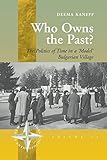Who Owns the Past? : The Politics of Time in a 'Model' Bulgarian Village / Deema Kaneff.
Material type: TextSeries: New Directions in Anthropology ; 21Publisher: New York ; Oxford : Berghahn Books, [2004]Copyright date: ©2004Description: 1 online resource (240 p.)Content type:
TextSeries: New Directions in Anthropology ; 21Publisher: New York ; Oxford : Berghahn Books, [2004]Copyright date: ©2004Description: 1 online resource (240 p.)Content type: - 9781845452988
- 9781782386629
- online - DeGruyter
| Item type | Current library | Call number | URL | Status | Notes | Barcode | |
|---|---|---|---|---|---|---|---|
 eBook
eBook
|
Biblioteca "Angelicum" Pont. Univ. S.Tommaso d'Aquino Nuvola online | online - DeGruyter (Browse shelf(Opens below)) | Online access | Not for loan (Accesso limitato) | Accesso per gli utenti autorizzati / Access for authorized users | (dgr)9781782386629 |
Browsing Biblioteca "Angelicum" Pont. Univ. S.Tommaso d'Aquino shelves, Shelving location: Nuvola online Close shelf browser (Hides shelf browser)

|

|

|

|

|

|

|
||
| online - DeGruyter To the Bomb and Back : Finnish War Children Tell Their World War II Stories / | online - DeGruyter The Inverted Mirror : Mythologizing the Enemy in France and Germany, 1898-1914 / | online - DeGruyter Academic Anthropology and the Museum : Back to the Future / | online - DeGruyter Who Owns the Past? : The Politics of Time in a 'Model' Bulgarian Village / | online - DeGruyter Transatlantic Parallaxes : Toward Reciprocal Anthropology / | online - DeGruyter Indigenous Medicine Among the Bedouin in the Middle East / | online - DeGruyter Aging and the Digital Life Course / |
Frontmatter -- CONTENTS -- ACKNOWLEDGEMENTS -- ABBREVIATIONS -- GLOSSARY -- INTRODUCTION: POLITICS AND THE PAST -- CHAPTER 2 A ‘MODEL VILLAGE’ -- HISTORY: A Brief Introduction to Chapters 3 and 4 -- CHAPTER 3 SOCIALIST HISTORY, POLITICS AND MORALITY -- CHAPTER 4 CONTESTING HISTORY -- TRADITION: A Brief Introduction to Chapters 5 and 6 -- CHAPTER 5 THE CHARACTER OF TRADITIONS -- CHAPTER 6 TRADITION AND HISTORY: CONTRASTING CONSTRUCTIONS OF THE PAST -- FOLKLORE: A Brief Introduction to Chapters 7 and 8 -- CHAPTER 7 DEFINING FOLKLORE -- CHAPTER 8 FOLKLORE IN A NEW BULGARIAN VILLAGE -- CONCLUSION: A NEW MODEL FOR THE VILLAGE -- APPENDICES -- REFERENCES -- INDEX
restricted access online access with authorization star
http://purl.org/coar/access_right/c_16ec
In the decades since the collapse of socialism in eastern Europe, time has been a central resource under negotiation. Focusing on a local community that was considered a "model" in the socialist period, the author explores a variety of state-sponsored and unofficial pasts - history, folklore, and tradition - and shows how they "fit" together in everyday life. During the socialist period, the past was a central dimension of local politics and village identity. Post-socialist development has demanded a revaluation of temporality - as well as public and private space. This has led to fundamental changes in social life and political relations, reduced local resources, threatened village identity and transformed political activity through the emergence of new political elites. While the full implications of this process are still being played out, this study underlines some of the fundamental processes prevalent across eastern Europe that help explain widespread ambiguity vis-B-vis post-socialist reform.
Mode of access: Internet via World Wide Web.
In English.
Description based on online resource; title from PDF title page (publisher's Web site, viewed 25. Jun 2024)


